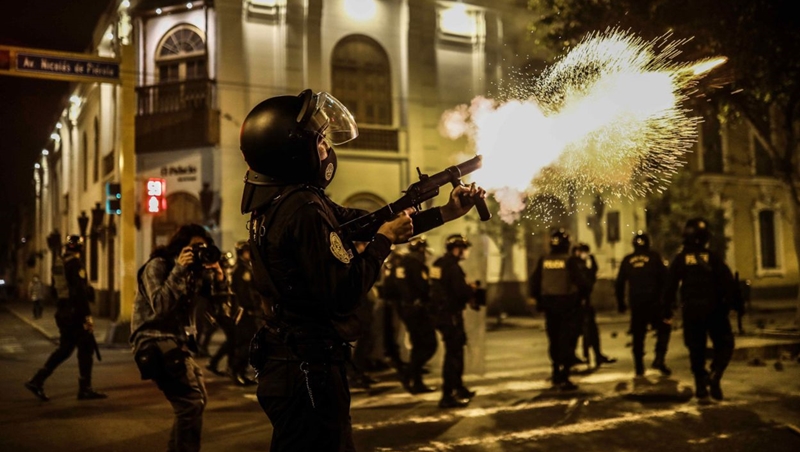At least two people died during brutal repression unleashed by the Peruvian National Police in Lima on Saturday, November 14. Throughout the country, the sixth day of protests were a response to the appointment of Peru’s congressional leader as the country’s president after an impeachment vote against President Manuel Vizcarra on November 9 — on the grounds of “moral incapacity” — ousted him from office.
Though Vizcarra had already been accused of corruption, the manner and speed of his removal unleashed a wave of protests after former Congress President Manuel Merino took office as president of the Republic. Two days later, Merino selected his prime minister, the ultra-neoliberal Ántero Flores-Aráoz; the day after, he swore in an entire cabinet of technocratic and conservative figures from previous governments, all of whom had previously also left power due to corruption charges.
This provoked outrage and protests spread across the country. On Saturday, the sixth day of protests, there was a national march. That night, the National Police brutally repressed protestors in the center of Lima, using firearms and tear gas and leaving two young protesters dead.
News of the assault created an immediate crisis, provoking the collapse of Merino’s new cabinet and a demand from the new president of Congress that Merino resign the presidency. On Sunday, November 15, Merino finally addressed the nation and resigned — less than a week after his inauguration.
As the Washington Post reported, “For millions of Peruvians, particularly the young, Merino had become the face of a corrupt political class that has entrenched itself in Congress … The mass protests that forced Merino to step down were less about defending Vizcarra than expressing public outrage at the political forces that had removed him.”
Repression
Merino’s last 24 hours in office began with thousands of people gathering in the Plaza San Martín in Lima for the Second National March against his newly installed government and against widespread corruption. The march was peaceful, marked by the music and energy of its young participants. Its route wove through Nicolás de Piérola, Wilson Avenue, Paseo Colón, Grau Avenue, and finally Abancay Avenue, where a police contingent refused to let the demonstrators pass by Congress.
Around 7 pm, the Peruvian National Police attacked the demonstrators with tear gas, projectiles, and bullets, causing many injuries and killing two people. A 25-year-old man was declared dead on arrival at Almenara Hospital; he had 11 gunshot wounds to his face, neck, and torso. A second victim, identified as 24-year-old Inti Sotelo Camargo, was pronounced dead at Hospital Grau; he had four injuries to the torso from projectiles.
After the news of the two murders broke, ministers in Merino’s cabinet — including the prime minister — began to resign their posts. The number reached a dozen and was expected to grow throughout Sunday. The resignations, along with demands that the president himself step down, highlighted the fragility of the Merino regime. But until Sunday, Merino had been unresponsive.
Resignation
Luis Valdez, the new president of the Congress, convened an emergency session of Congress on Sunday morning where all the political parties agreed to ask for Merino’s “immediate” resignation. He announced that the Congress would begin impeachment proceedings if Merino did not comply.
“I want to let the whole country know that I’m resigning,” Merino said in a televised address on Sunday. The statement sparked “wild street celebrations in the capital Lima after protests against his rule,” reported TRTWorld. But he also announced that his cabinet would continue while Congress worked to name a new president. As the Post put it, “it was unclear who he was talking about” given all the resignations overnight.
Prime Minister Flores-Aráoz, well known for his reactionary positions, had at first tried to justify the brutal police repression, arguing that they were responding to vandalism. Media coverage shows clear evidence that this is false and that it was the police who violently attacked the demonstrators.
According to the Post, over the course of the protests, “Amnesty International counted 94 injured and 41 disappeared, who were thought to have been arrested, including by undercover police snatching individuals from the protests. The group accused the police of human rights abuses …”
The situation in Peru is volatile and uncertain. “The resignation set Peruvians up for their fifth president in five years,” the Post explained, “as the South American nation faced its worst constitutional crisis since the fall of Alberto Fujimori’s tainted presidency two decades ago.”
Based in part on an article published in Spanish on November 15 in La Izquierda Diario.
Translated by M.K. Kumar












